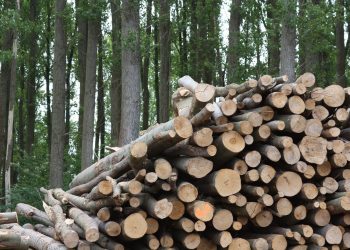Whether it is ugali, a popular dish prepared from maize flour and often accompanied by meat, vegetables and pulses, or porridge, the staple of the Kenyan diet is maize. Nothing goes to waste from the harvest, as the crop’s by-products are used as livestock and poultry feed.
But experts say this critical staple food continues to face challenges as pests and plant diseases stifle yields, prompting the need for imports.
Zaida Kombo, a farmer in Mtwapa, Kilifi County, has experienced the effect of both pests and diseases on her maize crop. Although she also grows cassava and bananas, she prefers maize for its taste and long shelf-life. Kombo started farming four years ago and used to harvest three or four 90-kilogram bags of maize twice a year from her one-acre — enough to last her until the next harvesting season.
“Out of three to four bags, I could sell two bags to get money to take my children to school, then store the remaining to supply food to my family until the next harvesting season,” she says.
These days, Kombo is a worried woman, watching her maize production dwindle over time. She got just half a 90kg-bag from her last harvest because of damage caused by such persistent pests as the stem borer and fall armyworm. The pest problem is compounded by low soil fertility and the difficulty of controlling weeds. Despite the losses, she continues to grow maize because it complements the kale, cassava and bananas she raises as a source of food for family.
Now she is appealing to researchers at the Kenya Agricultural and Livestock Research Organization (KALRO) to come up with a lasting solution to tame the pests, and also help farmers access quality farm inputs. Researchers believe they have a solution — insect-resistant Bt maize.
The maize, which is genetically modified (GM) to include a gene from the Bacillus thuringiensis (Bt) bacterium that provides insect protection, will help farmers improve yields and control pests without chemical insecticides. Bt has long been popular with organic farmers because it is considered a “natural insecticide” and is only toxic to specific insects.
Kasichana Mwachilimo, another farmer in Kilifi County, says she has applied fertilizer and tried to control pests with pesticides, but the costs have proved prohibitive. “We want a better harvest, but we do not know much about maize research as we hardly get expert advice or extension services,” she says.
Charles Chiro, KALRO senior technical assistant in the food crops program, maize breeding and agronomy section in Mtwapa, says the stem borer is the main pest affecting maize production. The problem is countrywide, reducing yields significantly. KALRO researchers have traversed the coastal region counties of Kilifi and Kwale, working with farmers and evaluating maize varieties adapted to the coastal lowlands in search of varieties that could be improved through research. However, all varieties currently grown in the region are infected by the stem borer.
The larvae of the stem borer feed on the maize plant, retarding its growth and in some instances killing it. Farmers have come up with their own ways of controlling the stem borer, like adding mixtures of sand and ash to the soil and applying pepper and neem, but this has not been effective compared to chemical control. But many do not go for chemical control because of the costs involved, Chiro says.
Chiro says the use of chemicals also has become an environmental pollution issue, as many farmers do not know the proper application methods for their regions, while others use insufficient amounts, which can lead to insects developing tolerance to pesticides. With Bt technology, which gives crops inherent resistance to certain pests, farmers could cut their use of pesticides, boost production and allow other beneficial insects such as bees, which are good for pollination, to thrive, Chiro says.
KALRO Director-General Dr. Eliud Kireger says KALRO has sought approval from relevant government institutions such as the National Biosafety Authority and Kenya Plant Health Inspectorate Services (KEPHIS), to formally introduce Bt maize in the country.
“The country is losing about 40 percent of the 42 million bags of maize produced annually to the stem-borer and other pests and we have to import to make up for the losses,” Kireger says. “The Bt maize has already been approved in other countries like Malawi, Nigeria and South Africa, where the technology has helped them double their maize yields.”
Last year, the Kenya government imported two million bags of white maize for human consumption and an additional two million bags of yellow maize for animal feed after the country’s strategic grain reserves were contaminated by aflatoxin, a mold-related toxin known to cause cancer and other health problems. The government had to destroy 124,625 50-kilogram bags of condemned maize stocks.
The stem borer alone destroys 12 percent of the nation’s maize production, while the fall armyworm causes an average maize loss of 60 percent, according to research by the Center for Agriculture and Bioscience International (CABI). Kireger allayed any fears about the safety of Bt maize, saying that it has been tested in accordance with international standards. It’s already widely grown in the United States and South America and Bt has been used as an insecticide for more than 50 years.
James Karanja, principal investigator of the TELA maize project, says the results of KALRO’s three-year trials show that Bt maize effectively controls infestation and damage by the two major insect pests affecting maize production in Kenya — the spotted stem borer (Chilo partellus) and the African stem borer (Busseola fusca).
With these results, Kenyan farmers are now closer to growing GM (Bt) maize on their farms. The Bt maize planted earlier this year in western Kenya is already showing resistance to the destructive stem borer and fall armyworm pests, which will help farmers reduce their use of pesticide sprays.
“If you combine fall armyworm and stem borers, farmers almost get nothing,” Karanja says. “There is an urgent need to approve GMOs. As a scientist, we develop these technologies knowing that they will be used by our parents. There is no way we can do a shoddy job. We are here for the goodwill of the country.”
Bt maize is expected to be commercialized by 2022, if it is approved by Kenya’s relevant government agencies, says National Biosafety Authority CEO Prof. Dorrington Ogoyi.
The Bt maize research is part of Kenya’s 10-year Agricultural Sector Transformation and Growth Strategy (ASTGS), which is intended to build on previous strategies to revitalize the country’s agricultural sector by 2029 and make it a regional powerhouse. The strategy emphasizes integrating modern farming techniques into Kenya’s agricultural sector to improve productivity and includes lifting Kenya’s ban on GM crops.
Stephen Mutoro, secretary-general of the Consumers Federation of Kenya, notes that Kenya’s maize production continues to dwindle even as demand increases, resulting in a deficit of 15 million bags.
As a result, the cost of animal feed has shot up in East Africa. The Association of Kenya Feeds Manufacturers has raised concerns about the increased price of maize germ, which is mainly used to manufacture animal feeds. This has led to higher consumer costs for essential proteins such as eggs.
Karanja says farmers often debate whether to grow other crops when maize is hit by a new plant disease, pest pandemic or other limiting factor, such as maize lethal necrosis, fall armyworm, drought or aflatoxin.
However, given the ubiquity of maize in multiple, diverse livelihood systems across Kenya and elsewhere in sub-Saharan Africa, national and international crop science institutions have responded with new research to improve existing maize varieties, as well as breed superior varieties with the ability to withstand persistent challenges, Karanja explains.



















































Discussão sobre este post